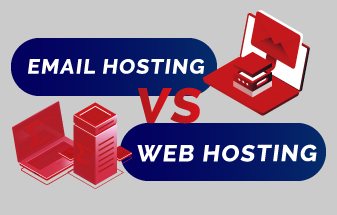
Utilizing email and web hosting is a very important part of the essential services for businesses and individuals who want to establish an online presence and identity. However, while both services are related to online communication, they serve different purposes and have distinct features. That’s why, in this blog post, we’ll discuss in further details the differences between email hosting Vs web hosting, and help you choose the right option for your needs.
What is Email Hosting?

Email hosting is an online service that provides users such as; individuals, organizations and businesses with a platform to send and receive emails using their own domain name. This allows businesses and individuals to have a professional email address that reflects their brand identity, which has a very positive impact on their credibility among clients. Using email hosting services can include a wide range of useful features such as email storage, spam filtering, virus protection, email forwarding, and more. Email hosting is essential for businesses of all sizes that require reliable email communication with customers, partners, and employees.
What is Web Hosting?
Web hosting is a service whose purpose is to provide users with a platform to host their own website data on the internet. Using web hosting services allows individuals and businesses to make their website accessible to the public by storing their website data such as files, multimedia and content on a web server. Web hosting services providers offer various types of hosting with multiple plans options such as shared hosting, VPS hosting, dedicated hosting, and more.
Web hosting is essential for businesses that want to establish an online presence and showcase their products or services to potential customers. It enables them to create a website that is fast, secure, and reliable, and can handle a large volume of traffic. Web hosting also provides features such as website builders, cPanel, SSL certificates, and more.
What is Included in Web Hosting Services?

The features included in web hosting services vary depending on the provider and the plan you choose. It’s important to choose a reliable web hosting provider that offers the features and support you need to ensure that your website is fast, secure, and reliable.
Server Space
Web hosting services provide server space to host your website files and data. This server space is typically located in a data center and is managed by the web hosting provider.
Bandwidth
Web hosting services provide bandwidth to handle traffic and data transfer to and from your website. The amount of bandwidth you get depends on the web hosting plan you choose. That’s why it’s better to use an online bandwidth calculator to determine the bandwidth amount you need.
Domain Name
Having a domain name that reflects your business identity is very important for your business. Some web hosting services offer a free domain name for the first year, while others require you to register a domain name separately.
Email Hosting
Email hosting can be sold separately as a standalone service. However, some web hosting service providers offer email hosting as a part of their packages, which allows you to create professional email addresses using your own domain name.
Website Builders
Many web hosting service providers offer website builders that allow you to create and design a website without the need for any coding knowledge.
Control Panel
Web hosting service providers grant access to a control panel, such as cPanel or Plesk, which allows you to manage features of your website, email, and others.
Security
Web hosting services provide security features such as SSL certificates, firewalls, and malware protection to keep your website safe from cyber threats.
Technical Support
Web hosting services provide technical support to help you with any issues you may encounter with your website or hosting.
In conclusion, despite the differences between email hosting vs web hosting, using both services are essential for so many online businesses throughout the world.